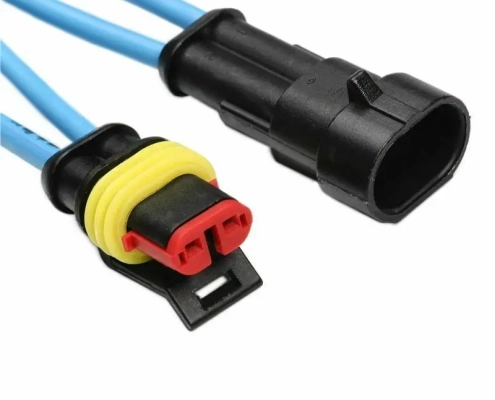Why Waterproof Connectors Are Essential for Modern Electrical Systems

1. Shielding Against Environmental Hazards
Waterproof connectors act as the first line of defense against water, humidity, dust, and chemical contaminants. Utilizing advanced seals (e.g., silicone gaskets), reinforced housings, and corrosion-resistant materials, they prevent moisture ingress that causes corrosion, short circuits, and signal interference. For instance, marine navigation systems rely on IP68-rated connectors to withstand saltwater immersion, while outdoor LED lighting depends on their resilience against rain and UV exposure
2. Enhancing Reliability and Durability
Unlike standard connectors, waterproof variants are engineered for extreme conditions. Key features include:
- Robust Materials: Stainless steel contacts and engineering plastics resist temperature swings (-40°C to 85°C), chemicals, and UV degradation.
- Stable Performance: Maintain uninterrupted power/signal transmission in vibrating machinery or fluctuating environments (e.g., wind turbines)
This reduces downtime by 40% in industrial automation and extends device lifespans in agricultural sensors exposed to mud and humidity

3. Mitigating Safety Risks
In high-risk environments like submarines or operating rooms, waterproof connectors prevent catastrophic failures:
- Electrocution Prevention: Insulated seals block leakage currents in wet conditions (e.g., pool lighting).
- Fire Avoidance: Eliminate sparks from short circuits in fuel-handling automotive systems
A study highlighted a 60% drop in electrical fires on ships using IP67+ connectors
4. Extending System Lifespan and Compliance
Waterproof connectors minimize corrosion-induced failures, slashing maintenance costs by 30% in offshore oil rigs and outdoor telecom gear. They also ensure adherence to strict standards:
- IP Ratings: IP68 (submersion up to 3m) for marine tech, IP65 (dust/water jets) for EVs
Industry Certifications: IEC 60529 for industrial equipment, ISO 8099 for automotive safety.

5. Cross-Industry Applications
| Sector | Use Cases | Key Benefit |
|---|---|---|
| Marine/Offshore | Submarines, oil rig sensors | Resists high-pressure saltwater |
| Automotive | EV charging ports, wiper systems | Vibration resistance + splash-proof |
| Healthcare | Sterilizable surgical tools, MRI machines | Survives chemical disinfectants |
| Smart Infrastructure | Traffic cameras, streetlights | Operates in -40°C to 85°C |
Future Innovations
Next-gen waterproof connectors integrate sensors for real-time fault detection (e.g., underwater drones) and modular designs for EVs. Miniaturized versions (e.g., USB-C IP68) are emerging for wearables and IoT devices




